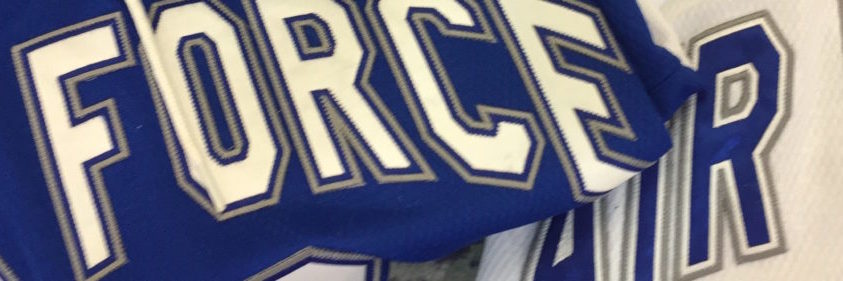In Part 2, we look at an area for improvement, special teams and the outlook going forward.
We’ll start with one of the more impressive stats from this season – the Falcons’s performance in close games.
Twenty-one of the 36 games (58 percent of the schedule) ended with a one-goal or tie margin. Air Force was 12-6-3 in those.
The Falcons also were very good in overtime, winning seven of nine and going 2-1 in shootouts.
They also were solid on the road, going 7-7-2 and 1-1 at the neutral site of Utica, N.Y., in the AHA final four.
And they showed a lot of finish, winning 11 of their final 18 games.
All positive signs.
But there’s this
OK, it wasn’t all peaches and cream. And there was one trend that emerged, re-emerged and popped up once more at the worst possible time. When things went badly, they tended to implode, primarily due to excessive penalties.
- Oct. 16 – An 8-0 loss at Denver was cemented when the Pioneers cashed in on three power-play goals to break open the game.
- Oct. 30 – An 8-1 loss at Colorado College, one night after a thrilling OT victory over the Tigers, was aided by Air Force giving up an astounding six PPGs, including four in a row during the second period and two more to start the third
- Jan. 28 – An 8-3 loss vs. Army – Twice Air Force took 5-minute majors, and twice the Black Knights put the puck in the net afterward. Air Force’s early 2-0 became a 5-2 deficit in less than 20 minutes of game time spread over the late first and first two-thirds of the second period.
- March 19 – A 7-0 loss to AIC in the Atlantic Hockey title game. The Yellow Jackets extended a 1-0 lead after one period courtesy of four PPGs and a short-handed goal.
In all, Air Force took 12 majors, or an average of one every three games.
If there is a silver lining, this is an area that can be corrected.
I’ll have the special
Those four games skewed some of the Falcons’ overall statistics.
Air Force’s power-play connected 17.4 percent of the time for a total of 24 goals.
The penalty kill, which actually went weekends at a time without allowing a goal, finished with 38 goals allowed and a 24.4 percent rate. Take the four meltdowns away and they allowed 23 goals down a man – a wash with the PP production.
Same thing with the scoring differential, which was 99-127. Take those four games away and it was 95-96, more in line with a team that finished .500.

Blocking shots is standard fare for Air Force. Photo courtesy of Paat Kelly and Air Force Athletics
Hello, I must be goalie
When Alex Schilling, the team’s lone senior and the lone goalie to wear a C in the Frank Serratore era, was available, he played. But due to Covid protocols and a few team-wide meltdowns, three other goalies saw action. Junior Austin Parkhad the most appearances (11), and his goals-against average of 2.23 and his .912 save percentage were solid. But freshman Guy Blessing emerged as the primary backup as the season wore on, and he started the two games Schilling missed. Blessing went 2-1 with a 3.02 gaa and a .889 save percentage.
What’s next
I’ll cover incoming freshmen in a future post. Suffice to say they will have a challenging time cracking this lineup because Schilling – as steady of a goalie, and person, as one could hope for – is the only player graduating. Yes, there could be a defection via the transfer portal, something that dinged the Falcons last summer when then-freshman top-line center Thomas Daskas transferred to Miami out of the blue. As of early May I had not seen any Falcons appear on any reports about the portal.
And I didn’t get the sense spending time around this group that that is a peril. After all, key performers such as Rowe and Brown actually sat out the entire 2020-21 season and came back stronger and engaged for this season. That should tell you something about the chemistry and commitment level of this group.
And the best news?
A handful of times during the season others in the college hockey world asked my opinion on an intriguing question: How much longer would Serratore remain the Falcons’ coach? Honestly, I had no idea, but I offered a guess of anywhere from five to 25 more years. He is a hockey coach through and through, and his passion and energy levels are the stuff of legend.
This season seemed to invigorate him, and the program for that matter, after a couple of Covid-affected ones knocked some of the wind out of a lot of our sails.
Serratore signed a three-year contract shortly after the conclusion of the season. That is great news for the program, which seems primed for a big season in 2022-23, Atlantic Hockey and for college hockey in general. (Of course it’s also great news for those of us who cover the program).
The needles on the instrument panel are indeed pointing up at Air Force.
©First Line Editorial 2022

